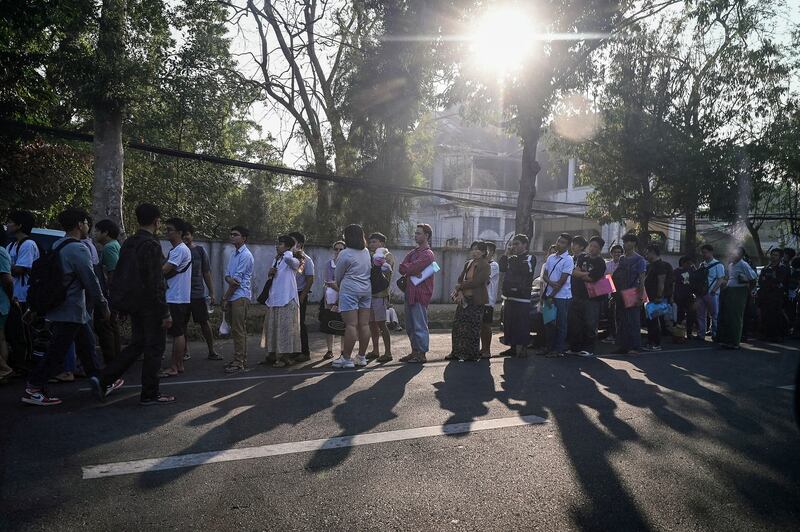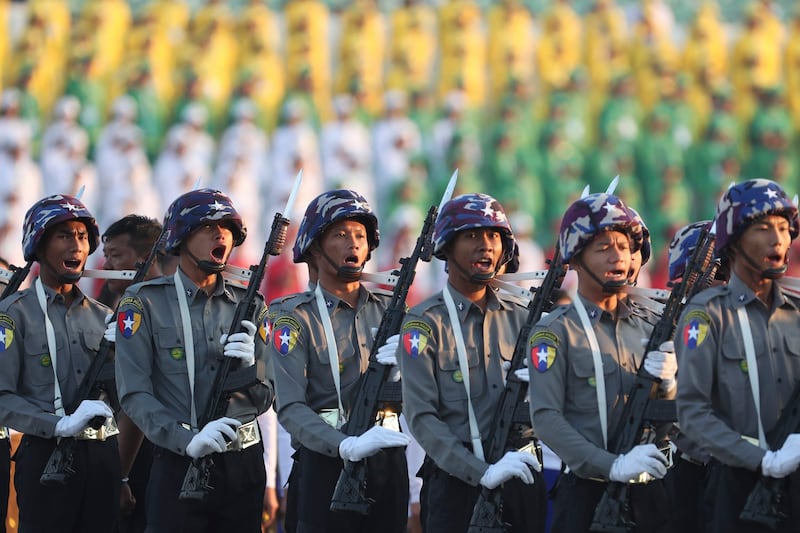Myanmar’s junta has appointed police chiefs to oversee conscription across the country as the military regime proceeds with its speedy implementation of a draft law enacted earlier this week.
Observers said the move will help prevent Burmese of fighting age from escaping the draft by relocating to “liberated areas” controlled by ethnic armies, while the shadow National Unity Government, or NUG – the civilian government-in-exile – labeled those who enforce the law “war criminals” and vowed to hold them accountable.
The draft drive comes as resistance forces and ethnic armies have scored significant victories against the military in Myanmar’s three-year civil war. Since October, the military has been put on its heels by joint rebel offensives that overran dozens of military camps and resulted in hundreds of soldiers surrendering.
On Feb. 10, the junta announced that it had assigned civilian officers to replace Police Col. Koko Lwin, a Naypyidaw councilmember, as well as three police brigadier generals and 11 other police colonels who held positions as state and regional transport ministers.
The shuffle was made on the same day junta leader Senior Gen. Min Aung Hlaing announced that the People’s Military Service Law, enacted in 2010 by a previous military regime though it had never been enforced, would go into effect immediately.
On Wednesday, the junta reassigned the 15 senior police officials to direct public military conscription in the states of Chin, Kachin, Kayah, Kayin, Mon, Rakhine, and Shan; the regions of Ayeyarwady, Magway, Mandalay, Bago, Sagaing, Tanintharyi, and Yangon; and Naypyidaw, which is classified as a union territory.
Blocking draft dodgers
Commenting on the reassignments, Saw Khin Maung Myint, the junta’s minister of economy and spokesperson for Kayin state, said the 15 were “returned to their original roles … to avoid failure in their police duties.”
However, a police officer who joined Myanmar’s anti-junta Civil Disobedience Movement, or CDM, suggested that they had been assigned to more specific tasks related to the draft law roll-out.
"Now that the military service law has been enacted, the police colonels have returned to their original duties to effectively implement the law and to suppress democracy activists,” said the officer, who spoke to RFA Burmese on condition of anonymity due to security concerns.

On Aug. 1, 2021, six months after the military seized power in a coup d’etat, the junta appointed the 15 as state and regional transport ministers. They proved instrumental in cracking down on youth who were leaving cities to join the armed resistance in the country’s ethnic army-controlled border areas.
Political commentator Than Soe Naing told RFA that the police chiefs will play key roles in enforcing the draft law.
“Young people who cannot avoid military service will move to areas controlled by ethnic armed organizations,” he said. “To prevent that, the role of the police becomes more vital and these police colonels have been appointed to enforce conscription.”
Troop shortages
According to Myanmar’s compulsory military service law, men aged 18-35 and women aged 18-27 face up to five years in prison if they refuse to serve for two years.
Professionals – such as doctors, engineers and technicians – aged 18-45 for men and 18-35 for women must also serve, but up to five years, given the country’s current state of emergency, extended by the junta on Feb. 1 for another six months.
Conscription is slated to be implemented at the end of April 2024, with a goal of recruiting up to 60,000 service members each year, in batches of around 5,000 people, junta spokesperson Major Gen. Zaw Min Tun said Wednesday.
Burmese of fighting age have told RFA they would team up with resistance fighters or leave Myanmar rather than serve as soldiers for the junta.
Enforcers to be ‘severely punished’
Kyaw Zaw, spokesman for the NUG’s President’s Office, said the shadow government plans to “take action” against those who implement the conscription law.
"Whoever aids in implementing the military service law by intimidating people, especially the youth, will be severely punished – including these police chiefs and other individuals, as well as organizations,” he said.

The NUG on Tuesday noted that the junta is losing ground in battles across the country and claimed that it had activated the People’s Military Service Law to “use the people as human shields on the battlefields to uphold their own interests and power.”
The government-in-exile also said that it will designate as war criminals all individuals and organizations that assist in the law’s implementation.
Translated by Aung Naing. Edited by Joshua Lipes and Malcolm Foster.
